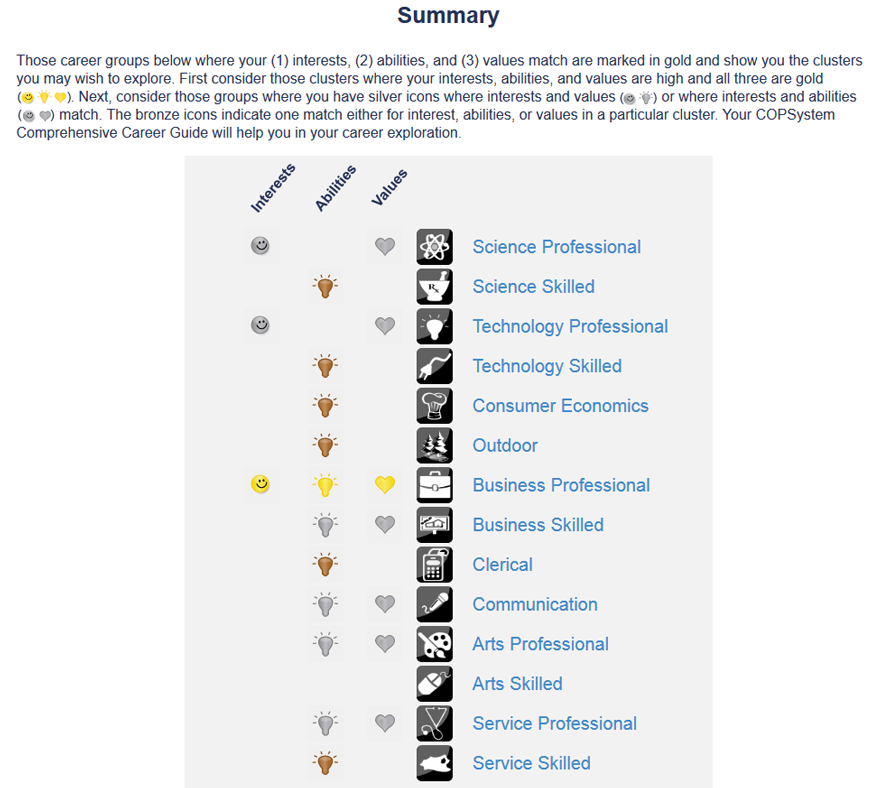

Stanine scores are percentile equivalent scores that indicate how the examinee’s score compares to others at the same educational level. Stanines range from 1-9. Scores from 1 to 3 are below average, 4 to 6 are average, and 7 to 9 are above average. If a score is a stanine 5, which is near the 50th percentile, about half (50 percent) of examinees who took the CAPS scored lower and half scored higher.
The eight CAPS subtests are designed to measure eight independent ability domains. These domains are relevant to a wide variety of jobs and career groups. The COPSystem Career Clusters, include jobs that require different skills and abilities. Therefore, scores from the CAPS subtests are aggregated according to the ability domains that are most relevant to each cluster.

In the COPES profile, scores are represented by bars to the right and left of the midline. Scores falling to the left of the center show strength in values described on the left and scores to the right of center show strength in those values given on the right. Values scores farthest from the center on the left or right represent the most extreme values scores which are then related to the career clusters. The relationship of the COPES values to COPSystem clusters is listed in the "Read More" section of the results page. The COPSystem Comprehensive Career Guide includes a description of each of the COPES values.

The COPSystem Summary section is an integrated summary of interests, abilities, and values. The highest interests, abilities, and values scores are marked with an icon to indicate the career clusters most relevant to the examinee.
Career Clusters with three gold icons should be considered for initial exploration because high levels of interests, abilities, and values have converged, which indicate a high degree of compatibility with jobs that comprise that career group.
Another recommendation is to have the examinee consider career areas that show high levels of interests and values. With additional training over time, areas that show relatively low ability scores may be improved. A convergence of interests and values, as shown by two silver icons, reveals important information that may be used to direct an examinee toward future career options.
Finally, consider the fourth or fifth highest scoring career clusters from Section 1. Occupational interests play a critical role in an individual’s future career choice. By beginning with a broad set of career options, the chances that individuals will benefit from career exploration and the research process increases because they are better able to identify jobs that are compatible with their view of themselves.
The Summary section of the results printout integrates assessment scores from the COPS, CAPS, and COPES. This unique characteristic of the COPSystem allows an examinee to continue the career exploration process with a more holistic understanding of how their own interests, values, and abilities converge in the world of work. A feature of this section is the interactive links from the career clusters to occupational information. When an examinee selects a career cluster they are taken to an information source with a definition of the career cluster, a list of job titles, skills, activities, college majors and related courses. In addition, each job title is further linked to O*Net™.

Needs Assessment – This section lists all of the subject areas in which an examinee indicated they need help or additional information. The Needs Assessment Summary is presented in the form of two questions at the end of the COPS Interest Inventory. Examinees are asked to indicate either a ‘yes’ or ‘no’ to a list of 19 skills given the prompt “I need help in…” the following areas.

Additionally, the COPSystem Comprehensive Career Guide is a valuable resource designed to be used in conjunction with the COPSystem Summary.
This career guide defines each career cluster, lists multiple examples of occupations, including related courses of study, and the skills and abilities required to perform these jobs successfully. Ideas and activities that foster a meaningful career exploration experience are also included in this important reference.